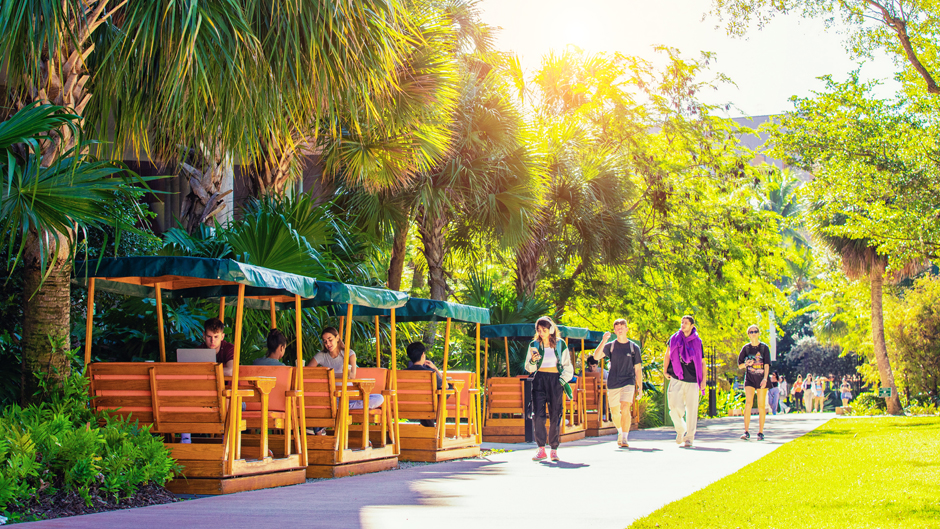The University of Miami has long empowered aspiring engineers, architects, and entrepreneurs from all disciplines to develop design ideas as part of their coursework and capstone projects.
The next step—the ability to launch student-created concepts in the marketplace—has received a significant boost with a $5 million pledge from University alumnus Angel Alvarez, founder and chairman of ABB OPTICAL, and his family to establish the University Student Startup Accelerator or USTAAR.
The USTAAR program is open to any student or student team from any area of the University and will nurture and support their new ideas from inception to implementation.
Motivated by their own experiences as successful entrepreneurs, Alvarez and his brother, Victor, seek to galvanize student entrepreneurs—helping them turn their daydreams into real-life ventures. “Our vision is to be a catalyst that allows students to see how they can change the world,” explained Angel Alvarez.

The gift to create USTAAR is part of the University’s Ever Brighter: The Campaign for Our Next Century. The most ambitious in the institution’s history, the $2.5 billion campaign is set to conclude in 2025, when the University will celebrate its centennial.
A portion of the Alvarez family’s gift will provide seed funding to 20 student-led teams each year for the duration of the commitment. These grants, awarded through a competitive process, will enable the teams to advance their ideas from concept to prototype, minimum viable product (MVP), and feasibility testing.
From there, an annual “Shark Tank”-style pitch competition will yield five finalists to receive further funding to move their MVPs into products, build their intellectual property, refine their business plans, and receive guidance on preparing presentations to investors. The goal is for these five teams to progress to startups and reach the market within three years of initiation.
The pitch competition is the centerpiece of a wide-ranging set of USTAAR initiatives to fuel student innovation and entrepreneurship across the University. A startup studio housed in the College of Engineering will provide paid full-time summer employment to students creating products for local industries. A robust set of related activities and resources, including scholarships for underrepresented minority student entrepreneurs and high-impact, cross-disciplinary training programs focusing on various aspects of entrepreneurship, such as prototyping and intellectual property, will further strengthen the foundation at the University for the next century of student entrepreneurs and startup creation.
Suhrud Rajguru is the director of USTAAR and one of its most passionate champions.
As a professor of biomedical engineering and otolaryngology, Rajguru has overseen dozens of senior design projects in the College of Engineering. As assistant vice provost for research workforce development, he is part of a team that matches researchers and scholars with funding, collaborators, and the tools necessary for success. And as a successful entrepreneur, he knows from first-hand experience how vital early mentoring and financial support are.
“Any startup company knows that the first investment is the most critical to get you off the ground,” Rajguru said. “The majority of startups fail because they don’t know where to get that. We didn’t have any program to support students at the level of $20,000 to $100,000” before the Alvarez family stepped up, along with an earlier donor, scientist, and entrepreneur Jonathan Rothberg, who established the Miami Engineering Rothberg Catalyzer Award.
In the College of Engineering, Rajguru has already worked with student teams whose design concepts show commercial promise. His most recent cohort of senior design projects yielded some remarkable ideas, including from two teams that received Rothberg Catalyzer Awards.
Timothy Arcari, a graduate student in the joint B.S./M.S. program in biomedical engineering (BME), and Joseph Cherubin, a senior BME major, created HemoFix, an automated tourniquet that anyone can use in an emergency.
Traditional manual tourniquets require significant strength to work correctly and have a high failure rate. Surgical tourniquets are expensive and immobile. Arcari and Cherubin’s portable smart tourniquet employs compressed air cartridges so that anyone, regardless of age or fitness, can stanch bleeding in an emergency. They got the idea from Miller School students who identified the problem, and their goal is straightforward: to save as many lives as possible.
Arcari and Cherubin wholeheartedly credit the support of Rajguru and other faculty, mentoring teams, and donors at the U that enabled them to improve and test their prototype, refine their business model, enter competitions such as eMerge Americas, and move their concept toward marketability. “We are tremendously grateful for all the resources UM has provided us, and we can’t wait to see how far we can take this valuable product in years to come,” Arcari said.
Another student team, Joy Jackson, Kailyn Nuñez, and Erin Ravindran, all 2023 BME graduates, created the PrepAir Patch, a noninvasive, minimalistic way to detect the respiratory rate of premature infants in a neonatal intensive care unit. “As student entrepreneurs, having the guidance of professors and faculty is an incredible asset,” Ravindran said. “This support grants us the flexibility to think beyond monetary limits. The senior design classes and expo have served as an invaluable experience in learning, start to end, what it means to be innovators.”
USTAAR will broaden these opportunities to reach all corners of the University, where students apply their learning and creativity to devise marketable products that can make a difference beyond campus.
“The program will provide fundamental training, mentorship, and financial support for idea development and commercialization, with a goal to creating ’Canes-led startups that bring products to the market,” Rajguru said. “The program is open to all students and trainees at the University. The goal is for these student-led startups to enhance socioeconomic development in South Florida and beyond.”
Working together to oversee this multidisciplinary student startup accelerator are the Office of the Vice Provost for Research and Scholarship and the College of Engineering with expertise from the Office of Technology Transfer, U Innovation, and other strategic areas of the University.
"Imagine a future where our students' brilliant ideas not only spark innovation but also translate into real-world solutions, improving lives and industries,” said Guillermo “Willy” Prado, interim executive vice president for academic affairs and provost. “This gift fuels that vision by bridging the gap between academic research and commercialization. Thanks to our donors' generosity, we're empowering students to become the next generation of inventors and entrepreneurs, their boundless creativity guided by expert mentorship."
Rajguru enthusiastically agreed. “At the University of Miami, we have amazing students who are very talented and who come up with brilliant ideas. This gift will be completely transformative and make the University a destination for these student entrepreneurs, while creating a major impact and societal benefit in South Florida and beyond.”
The USTAAR 2024 Seed Funding application is open to all current University of Miami students until March 1, 2024. Additional information and the application form are available here.

